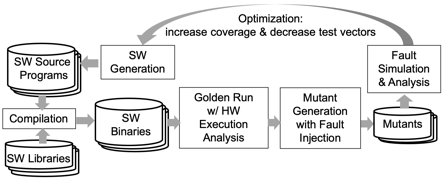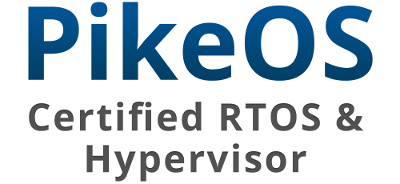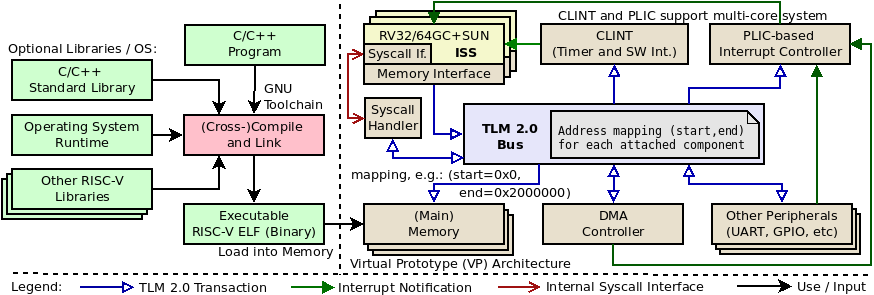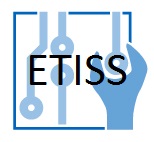Fault Effect Simulation and Analysis for RISC-V (FEAR-V)
FEAR-V is a fast scalable simulation and analysis framework for RISC-V architectures based on QEMU. The generation, simulation, and analysis can be scaled by ISA configuration as well as n-bit permanent and transient faults. The fault injection covers GPR, CSR, instruction, and memory analysis.
The source code of FEAR-V is freely available with all its components and has been published under https://github.com/hni-sct/fear-v.
FreiTest
FreiTest (developed from PHAETON) is an ATPG (Automatic Test Pattern Generation) Framework based on SAT-Solving (Boolean Satisfiability Problem) and BMC (Bounded Model Checking). It generates Test Patterns and Software-Based Self-Tests (SBSTs) for synthesized circuits and is under active development. First results on achieved Fault Coverages have been published on the IEEE ETS2023 conference in Venice under the title "Constraint-Based Automatic SBST Generation for RISC-V Processor Families".
PikeOS Operating System and Hypervisor
PikeOS and PikeOS for MPU are each a real-time operating system and hypervisor for embedded systems. It provides partitioning to separate different applications or guest operating systems from each other. PikeOS is often combined with ELinOS, SYSGO's embedded Linux, which is then run in a partition under the PikeOS hypervisor.
SYSGO issues evaluation licenses in the scope of the Scale4Edge project to interested project partners.
RISC-V VP
An extensible and configurable RISC-V based Virtual Prototype (VP) implemented in SystemC TLM. The feature set includes support for the RV32GC and RV64GC ISA, privilege levels (M,S,U), virtual memory, SW debug via Eclipse, a HiFive1 configuration and several operating systems including Linux. At UB the RISC-V VP serves as platform for several different research directions (visit https://agra.informatik.uni-bremen.de/projects/risc-v/ for further information and the most recent updates).
MIT
ETISS - Extendable Translating Instruction Set Simulator
ETISS is a C++ ISS (Instruction Set Simulator), which is designed to simulate instructions for a target core on a host computer. It translates binary instructions into C code and appends translated code into a block, which will be compiled and executed at runtime. As aforementioned, it is Extendable, thus it supports myriad level of customization by adopting the technique of plug-ins. ETISS supports varied Instruction Set Architectures (ISAs) according to user needs (see architecture models in ArchImpl/).
See file LICENSE inside GitHub Repo.




